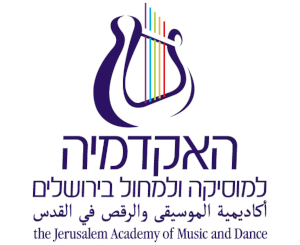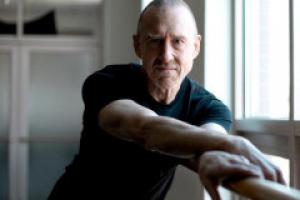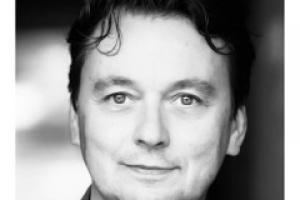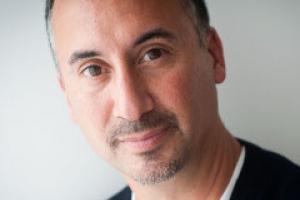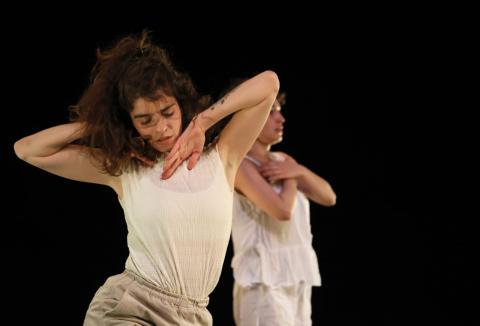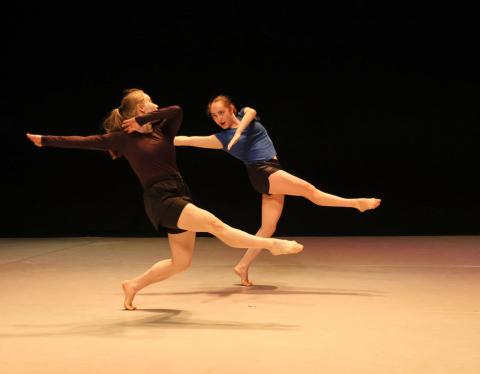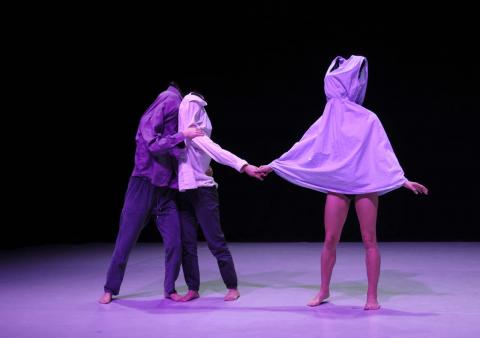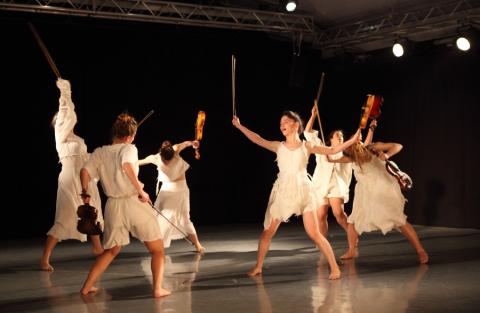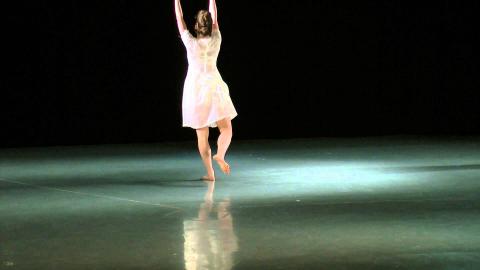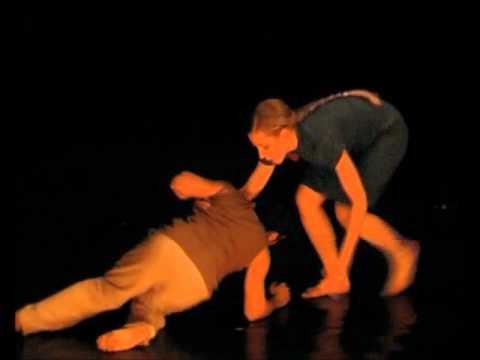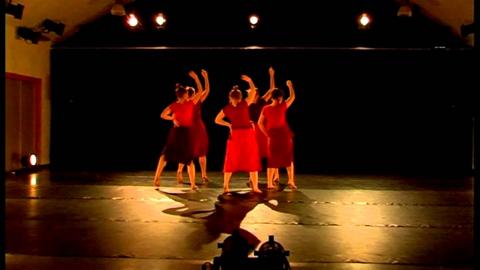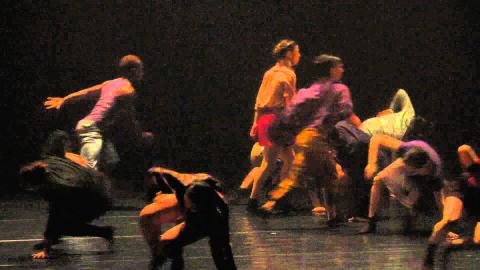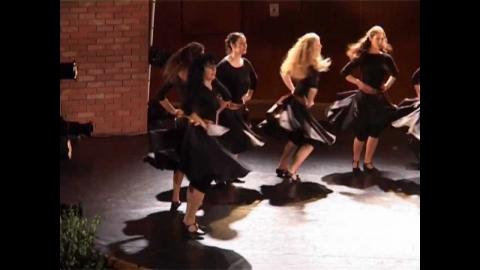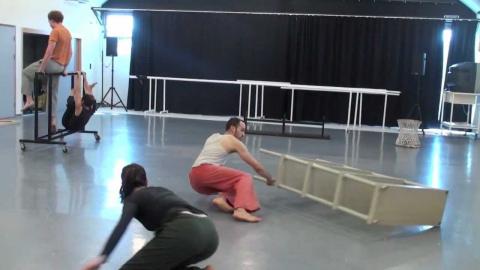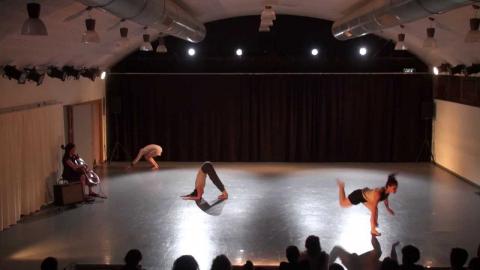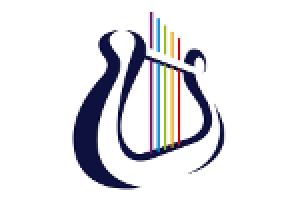The Dance Faculty, for decades, is a home that nurtures the next generations of dance personalities in Israel. A home for an invaluable development process for those who want to find a significant place in the dance field in Israel and abroad. Our studies spring from a clear identification of the predispositions of the heart and are guided by the understanding of the body and uncovering the artistic inclinations, much like a personal compass, of each and every one in the faculty.
The Dance Faculty is an international center of dance for students from all over the world, who wish to study with our internationally renowned team of teachers. Through a diverse study program we grant our students a Bachelor's and Master's degree, a Teaching Certificate, and above all the freedom and opportunity to develop their skills and become sought-after dancers, choreographers and teachers.
The Dance Faculty offers:
- Professional training: the faculty offers diverse, comprehensive and in-depth study programs, which give our students a solid foundation in a vaste choice of dance techniques and styles.
- Internationally renowned staff: amongst the faculty you’ll find dancers, choreographers and master teachers from Israel and around the world. An unparalleled team of dance experts guide our students through their studies.
- Multinational environment: the faculty hosts teachers and students from all over the world, allowing our students exposure to different cultures and develop international connections.
- Performances and projects: we offer our students opportunities for part taking in performances and dance festivals that allow them to further develop and fine tune their skills and to experience first hand the professional world.
- Connections: the faculty creates and encourages collaborations with cultural institutions and various organizations in Israel and abroad, in the framework of residencies, companies and student exchanges with various dance academies from all around the world.
- Focus on professional development: the study program of the faculty is divided between four focuses, allowing each and every student to deepen and for deeper development according to the abilities and according to the inclination of the heart and core of the students.
Shall we dive into the curriculum?
The four-year process for undergraduate studies is divided into three stages:
First Year
An introduction to the exciting and immense world of knowledge of the Dance Faculty. This year allows the new students to get acquainted with a wide range of dance techniques and different approaches of development. From classical ballet to the most contemporary techniques, working from 'feeling to the form’ and from ‘form to the feeling’, our students enter the amazing world of research in choreography, improvisation, somatic movement, repertoire and exciting theoretical subjects with the careful guidance of our expert staff.
Second and Third Years
- The years of FOCUS. By now discovering their field of interest and heart beat, our students dive straight into one of our four specialization options, or as we call them: FOCUSES.
- Performance Focus: training to become a contemporary dancer through challenging technique classes, repertoire workshops and creative processes. The students of the focus are meeting with choreographers from Israel and abroad and participate in performances and projects in Israel and abroad.
- Movement Focus: research of the worlds of improvisation, somatic dance, emotion and consciousness. The focus is based on the rich movement tradition and is being constantly updated through asking questions about what it means to be an artist/teacher/researcher in our era. A complete and holistic view on being connected to our bodies.
- Choreography Focus: expansion and specialization in the field of art and creativity. Perfection of personal movement expression and connection skills. Personal coaching, discussions with and introduction of the work methods of contemporary dance choreographers in Israel and around the world. The students of the focus are encouraged to develop collaborations with creators from other disciplines.
- Multicultural Focus: a fusion between technique, repertoire and creation that stems from rich cultural information and from ancient practices in a contemporary interpretation.
Fourth Year
The year of integration and summary. This year is intended for refining the knowledge gained during the previous years and translating it into sustainable work with the dance field in Israel or abroad. Our students are encouraged to spread their wings and fly while under the watchful eyes of this final year’s mentors. They are to integrate all the accumulated information, skill sets and connections in various ways such as: apprenticeship in a dance company, artist residency program in a cultural institution or dance center, community project, dance entrepreneurship program, dance studies abroad as part of student exchange programs and more. This year is dedicated to the final personal graduation project, accompanied by personal coaching, mentorship, in cooperation with students from other focuses, from other faculties and with a variety of options from outside the Academy and abroad.
Who is on the faculty team?
Mate Moray - Dean of the Dance Faculty
Ronen Itzhaki - Head of the B.Dance degree programs
Dr. Michal Hershkovitz Michaeli - Head of the Master’s degree programs
Our teachers in the B.Dance programs: Alexander Alexandrov - Classical Ballet, Eilat Almagor - Feldenkrais, Tal Adler - Release, Dr. Dana Bar - Composition, Movement and Movement Notation, Sigal Bergman - Media, Melanie Berson - Contemporary Dance and Methodology, Choreography and Improvisation, Moran Dekel - Cunningham based Modern Dance, Shlomit Fundaminsky - Release and Composition, Tomer Golan - Contemporary Technique and Repertoire, Noga Goral - Movement Notation, Dr. Emma Gashinsky - Arts, Michael Getman - Composition, Roni Hadash - Release, Ronen Itzhaki - Composition, Movement and Methodology, Mate Moray - Classical Ballet, Michal Samama - Composition, Prof. Neta Pulvermacher - Choreography and Repertoire, Orly Portal - Repertoire and Portal Method, Galia Tzur - Axis Syllabus and Anatomy, Ilana Shtayer - Horton based Modern Technique, Mia Reshef - Contact Improvisation, Daniella Schapira - Classical Ballet Methodology, Anat Shamgar - Improvisation, Ilanit Tadmor - Improvisation and Movement, Shani Tamari Matan - Dance History, Adi Zelinger - African Dance, Noa Zuk - Contemporary Dance and Repertoire, Aleksy Poliansky, Yevgeni Kaminsky and Sonia Mezer - Piano Accompaniment
Our teachers in the Master's degree programs: Dr. Dana Bar - Analyzing Creations. Dance and Rituals, Albert Beger - Improvisation with Musicians, Sigal Bergman - Choreography and Media, Oded Graf - Choreography, Dr. Emma Gashinsky - Performance, Multidisciplinary Art and Methodology, Dr. Michal Hershkovitz Michaeli - Pedagogy, Ronit Ziv - Choreography, Dr. Michal Hefer - Community, Dance and Music, Dr. Hodel Ofir - Pedagogy and Diversity, Dr. Sharon Tourel - Oriental Dance, Idan Cohen - Choreography and Appropriation, Noam Carmeli - Improvisation and Site Specific, Dr. Tal Feder - Research Approaches, Prof. Neta Pulvermacher - Choreography and Projects, Orly Portal - Choreography, Prof. Michael Klinghofer - Pedagogy and Aesthetics, Shani Tamari Matan - Performance
What courses am I going to study?
- Technique courses: African Dance, Classical Ballet, Contact Improvisation, Horton and Cunningham based Modern Dance, Contemporary Dance, Axis Syllabus, Release, Portal Method, Jazz and Hip Hop, Feldenkrais and more.
- Skill set courses: Choreography, Composition, Improvisation with Musicians, Improvisation, Movement Notation, Repertoire, Judson, Butoh, Classical Ballet and Modern Dance Methodology and more.
- Theoretical classes: Anatomy, Arts, History of Dance, Music, the Compass and the Map, Center and Margins in Israeli Dance and more.
What degree do I get upon graduation?
Bachelor's degree in Dance: B.Dance, a Master's degree in Dance: M.Dance.
Our degrees recognized by the Council for Higher Education as well as by academies around the world.
What is the duration of the study program?
The duration of studies is four years. There is a shortened curriculum for those with a rich background and a high level of performance skills which is determined at the entrance exams. The faculty can recognize previous studies or relevant dance experience from various dance institutions, companies and schools.
Do I also receive a dance teaching certificate?
Alongside the undergraduate studies, there is a separate program for Dance Education Studies. This program takes place on Tuesdays (compulsory courses) starting from the second year of studies at the Dance Faculty. The program offers studies in education and arts teaching, methodology courses, practice and personal coaching, fascinating elective courses and above all practical experience in teaching for a variety of ages, communities and populations. Upon completion of the program you will receive a teaching certificate.
What is the cost of studies?
The tuition fee at the Jerusalem Academy of Music and Dance is based on and similar to the university tuition fees. The exact amount of tuition fee is set by the Ministry of Education each year anew.
How does a week look like at the Dance Faculty?
Most days the classes are between 9:00 and 16:15.
In the first and second years the studies are five days, from Sunday to Thursday.
From the third year the studies are only four days: Sunday, Monday, Wednesday, Thursday, between 9:00 and 16:15.
The Dance Education Studies are on Tuesdays between 8:00-18:00.
The faculty sees great importance in effective and concentrated study days, days that allow alongside the study process also a choice of time for personal initiative, time for work and livelihood, time to rest the body and a meaningful personal life.
How will my day look like at the Dance Faculty?
9:00-12:15 Morning section: Mostly technique classes offered on four different levels. Each technique course offers a unique approach to strengthening the core, toning the muscles, achieving flexibility and building an ever evolving agile and virtuoso body. The courses are usually held at least twice a week.
12:15 to 13:00 Lunch break: a good time for a healthy meal, physical rest and a meeting with the student community of the academy, not only dancers but also musicians from the various faculties. A good opportunity to create new, surprising and diverse collaborations and relationships.
13:00-16:15: the first year students will begin their research into choreographic, somatic work, improvisation, collaborations with musicians, repertoire and theoretical classes such as art, music, anatomy, etc. From the second year, our students will choose a FOCUS to deepen their research and further build their knowledge and skills set.
How did it all began?
Our story begins in 1932, when the young pianist, Yocheved Dostorevsky, returned to Jerusalem from Vienna, where she completed her studies at the Academy of Music and Performing Arts and established a new school "for music and the art of movement”. It took 21 years for the institution to be fully recognized as a higher education institution. The starting point of the study program, according to Dostorevsky-Kopernik, was: "to train an educated musician or creator, who has broad knowledge in his profession, who knows how to think and sets ideals and values for himself that he strives towards".
Are there any scholarships at the Dance Faculty?
Yes, the Academy of Music and Dance in Jerusalem awards scholarships every year on socio-economic basis and scholarships are also given to students who excel in their studies at the Academy.
What is happening in the building of the Academy?
About 800 students study at the Academy each year, in different faculties, departments, programs, ensembles, creative and research bodies and productions inside and outside the Academy building. All the programs and initiatives are a home and platform for curiosity, for the study of an artistic language that breaks boundaries and sophisticated abilities that will lead to an innovative creation of music and dance. A melting pot for creators and performers with diverse abilities, with a deep knowledge in education and culture, an artistic stamp and a diverse cultural discourse that will lead the world of music and dance, in Israel and abroad.
The Dance Faculty is part of the academy's ecosystem which is essentially part of the city of Jerusalem, and Jerusalem is the quintessential and exaggerated Israel.
The Dance Faculty is a meeting point, where you are invited not only to study, but also to see it as a habitat, a natural environment that invites you to a multicultural meeting, to an artistic and human dialogue, to an encounter with yourself and with the worlds of others, beyond imagination, in a multi-faceted, changing, playful adventure.
What is the admissions process?
The entrance exams or auditions are conducted by the faculty in order to make sure that everyone who starts to study at the faculty will feel at home and in the right place. The audition usually contains a classical ballet, a contemporary dance and a creative improvisation session followed by an interview process. After the audition usually within two weeks the answer arrives vie email.
Anything else I need to know?
Yes, the Dance Faculty is an academic and holistic system. Whatever your FOCUS is, discipline and consistency are the way. Small steps every day amount to incredible achievements, as becoming an artis takes time and effort. But it’s absolutely worth it.
How can I get in touch with the Dance Faculty?
Mrs. Mirit Nissim - Faculty Coordinator: [email protected]
02-6759910 (Sundays, Mondays, Wednesdays, Thursdays 8:30-15:00)
Mr. Mate Moray - Dean of the Dance Faculty: [email protected]
Mr. Ronen Itzhaki - Head of B.Dance programs: [email protected]
